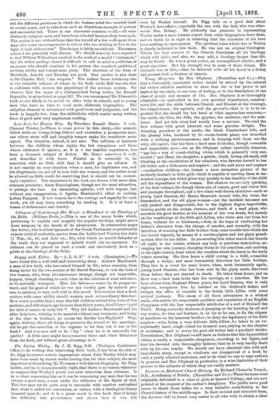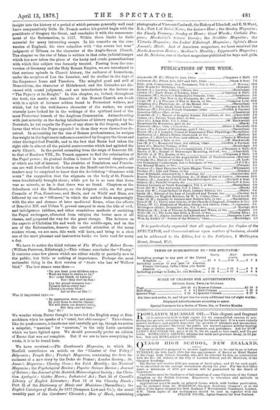Lectures on Mediaeval Church History. By Richard Chenevix Trench, D.D.,
Archbishop of Dublin. (Macmillan and Co.)—These lectures were originally delivered to a class of girls at Queen's College, and are now printed at the request of the author's daughters. The public have good cause to thank those ladies for a very valuable contribution to the Church history of the middle-ages. In their revised and extended form, the Lectures will be found very useful to all who wish to obtain a clear insight into the history of a period of which persons generally well read know comparatively little. Dr. Trench makes his period begin with the pontificate of Gregory the Great, and concludes it with the commence- ment of the Reformation, in 1517. Within these limits he finds material for many interesting essays. In his remarks on the con- version of England, his view coincides with "the severe but true" judgment of Milman on the character of the Anglo-Saxon Church. The chapter on the rise of Islam is written in that calm judicial temper which has now taken the place of the hasty and crude generalisations with which this subject was formerly treated. Passing from the con- version of Germany and the Holy Roman Empire, we are introduced to that curious episode in Church history, the outburst of Iconoclasm, under the auspices of Leo the Isanrian, and its decline in the days of the Empresses Irene and Theodora. The mingled good and evil of Monasticism, the character of Hildebrand, and the Crusades are dis- cussed with sound judgment, and are introductory to the lecture on "The Papacy at its Height." In this chapter, as, indeed, throughout the book, the merits and demerits of the Roman Church are dealt with in a spirit of fairness seldom found in Protestant writers, and which, but for the well-known character of the author, we could scarcely have looked for in the writings of the spiritual head of the most Protestant branch of the Anglican Communion. Animadverting with just severity on the daring falsifications of history supplied by the Decretals, he yet acquits the Popes of any share in the forgery, and be- lieves that when the Popes appealed to them they were themselves de- ceived. In accounting for the rise of Roman predominance, he assigns .clue weight to the legitimate influence exercised by Gregory the Great and other distinguished Pontiffs, and to the fact that Rome had taken the right side in almost all the painful controversies which had agitated the early Church. In the period extending from the reign of Innocent III. to that of Boniface VIII., Dr. Trench appears to find the culmination of the Papal power ; its gradual decline is traced in several chapters, all of which are full of interest. The rivalries of Dominican and Francis- can are well described in the lecture on the Mendicant Orders, and some -readers may be surprised to know that the Archbishop "dismisses with scorn" the suggestion that the stigmata on the body of St. Francis were fraudulently brought about; while yet he is as sure that there was no miracle, as be is that there was no fraud. Chapters on the Schoolmen and the Mendicants, on the Avignon exile, on the groat Councils of Pisa, Constance, and Basle, and on Wielif and Huss, are followed by one on " Offences," in which the author deals unsparingly with the sins and shames of later mediasval Rome, when the efforts of Benedict /CIL and Urban V. proved unequal to stem the tide of evil, and indulgences jubilees, and other scandalous methods of enriching the Papal exchequer, alienated from religion the better men of all classes, and prepared the way for the great change. The lectures on the aspects of Christian life and work in the middle-ages, and on the eve of the Reformation, deserve the careful attention of the many readers whom, we are sure, this work will have, and bring to a close one of the most pleasant and instructive books we have read for many a day.



































 Previous page
Previous page